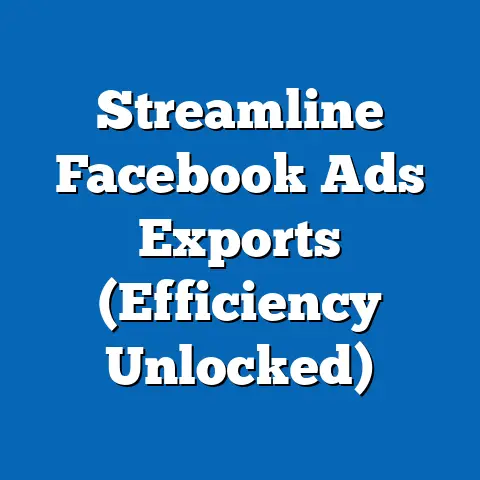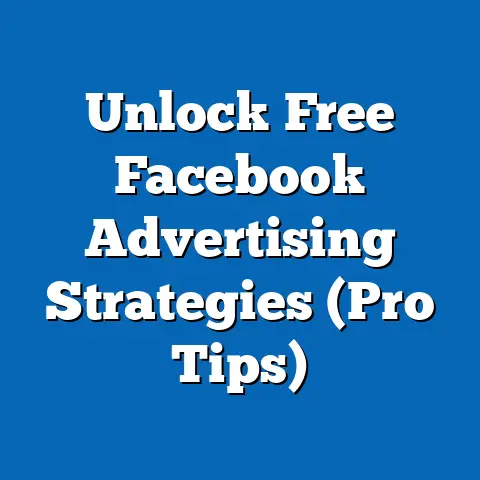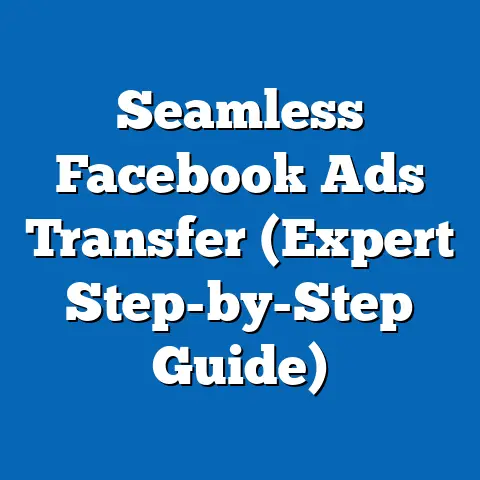Navigate Facebook’s Alcohol Ads Policy (Expert Insights)
Navigating Facebook’s Alcohol Ads Policy: Expert Insights
Comfort.
It’s what we seek in our favorite chair, in the familiar embrace of a loved one, and even in the products we choose.
As consumers, we gravitate towards brands that make us feel understood, valued, and safe.
And as advertisers, we strive to create that feeling of comfort – a sense of trust and familiarity that makes our audience more receptive to our message.
Facebook, with its billions of users, is a giant in the world of advertising, shaping consumer habits on a global scale.
It’s where brands connect with their audience, build relationships, and drive sales.
But advertising on Facebook isn’t a free-for-all.
It comes with rules, regulations, and a responsibility to ensure ads are ethical and appropriate.
This is especially true when it comes to advertising sensitive products like alcohol.
That’s why I’m diving deep into Facebook’s Alcohol Ads Policy.
It’s a topic that’s both crucial and complex, and navigating it successfully can be the difference between a thriving campaign and a costly misstep.
Whether you’re a seasoned marketer or just starting out, understanding these policies is essential for responsible and effective advertising.
Understanding Facebook’s Alcohol Ads Policy
Facebook’s Alcohol Ads Policy is a comprehensive set of guidelines designed to regulate the promotion of alcoholic beverages on its platform.
It’s not just about preventing underage drinking; it’s about promoting responsible consumption and adhering to legal standards across different regions.
Here’s a breakdown of the key aspects:
- Age Restrictions: This is the most fundamental rule.
Facebook requires advertisers to target users who are of legal drinking age in the country or region where the ad is being shown.
This means setting age parameters in your ad targeting to ensure your message only reaches adults. - Targeting Limitations: Beyond age, Facebook places limitations on other targeting options.
For instance, you can’t target users based on their interest in alcohol addiction recovery programs or related topics.
This is to protect vulnerable individuals and prevent ads from being shown to those who may be negatively impacted. - Content Requirements: The content of your alcohol ads must be responsible and avoid portraying excessive consumption or associating alcohol with risky behavior.
This means no ads that encourage binge drinking, driving under the influence, or promoting alcohol as a solution to personal problems. - Regional Variations: Alcohol advertising laws vary significantly from country to country.
Facebook’s policy reflects these differences, requiring advertisers to comply with local regulations.
This could mean different content restrictions, labeling requirements, or even outright bans on certain types of alcohol advertising in specific regions. - Landing Page Compliance: It’s not enough for your ad itself to be compliant.
The landing page your ad directs users to must also adhere to Facebook’s policies.
This means ensuring your website includes age verification measures and promotes responsible drinking.
Why these policies exist:
Facebook’s rationale behind these policies is multifaceted.
First and foremost, it’s about protecting young people from exposure to alcohol advertising.
Studies have shown that early exposure to alcohol marketing can influence underage drinking habits.
Secondly, it’s about promoting responsible drinking.
Facebook doesn’t want its platform to be used to encourage harmful behaviors or promote alcohol as a glamorous lifestyle choice.
Finally, it’s about legal compliance.
Alcohol advertising is heavily regulated in many countries, and Facebook needs to ensure its platform complies with these laws to avoid legal repercussions.
Recent Updates:
Like any evolving platform, Facebook’s policies are subject to change.
It’s crucial to stay informed about any recent updates or modifications to the Alcohol Ads Policy.
I recommend regularly checking Facebook’s Advertising Policies page and subscribing to industry newsletters to stay ahead of the curve.
My Experience:
I remember a campaign I ran for a craft brewery a few years back.
We had a fantastic ad creative showcasing their new seasonal beer.
However, the ad was rejected because our landing page didn’t have a clear age verification prompt.
It was a simple oversight, but it highlighted the importance of paying attention to every detail of the policy.
Key Takeaway:
Facebook’s Alcohol Ads Policy is a complex but essential set of guidelines.
Understanding and adhering to these policies is crucial for responsible and effective alcohol advertising on the platform.
Next Steps:
- Familiarize yourself with Facebook’s Advertising Policies page.
- Review your existing alcohol ad campaigns to ensure compliance.
- Subscribe to industry newsletters to stay updated on policy changes.
The Importance of Compliance
Compliance with Facebook’s Alcohol Ads Policy isn’t just a suggestion; it’s a necessity for any brand in the alcohol industry.
The consequences of non-compliance can range from minor inconveniences to serious legal and financial repercussions.
Here’s why compliance matters:
- Ad Rejection: The most immediate consequence of violating Facebook’s policy is ad rejection.
Your ad simply won’t be approved to run on the platform, wasting your time and resources. - Account Suspension: Repeated or severe violations can lead to account suspension.
This means you’ll be temporarily or permanently banned from advertising on Facebook, cutting off a vital channel for reaching your target audience. - Legal Repercussions: In some cases, non-compliance can result in legal action.
If your ads violate local alcohol advertising laws, you could face fines, lawsuits, or even criminal charges. - Damage to Brand Reputation: Violating Facebook’s policies can damage your brand’s reputation.
Consumers are increasingly aware of ethical advertising practices, and they’re likely to view brands that flout the rules in a negative light. - Loss of Trust: When you violate Facebook’s policies, you lose the trust of the platform and its users.
This can make it more difficult to get your ads approved in the future and damage your relationship with your audience.
Case Studies:
I’ve seen firsthand how policy violations can impact brands.
I recall a situation where a wine company ran an ad campaign that inadvertently targeted underage users.
The ad featured cartoon characters that appealed to children, even though the product was intended for adults.
The campaign was quickly shut down, and the company faced a significant backlash from consumers and advocacy groups.
Another example involves a spirits brand that ran ads promoting excessive drinking.
The ads featured images of people partying heavily and implied that alcohol was essential for having a good time.
These ads were not only rejected by Facebook but also drew criticism from public health organizations.
These cases highlight the importance of taking Facebook’s Alcohol Ads Policy seriously.
It’s not enough to simply read the guidelines; you need to understand them and implement them effectively in your advertising strategy.
Statistics:
While Facebook doesn’t release specific statistics on alcohol ad policy violations, industry reports indicate that non-compliance is a significant issue.
According to a study by the World Health Organization, alcohol advertising is often poorly regulated, and many ads violate existing codes of conduct.
My Experience:
I once worked with a client who insisted on pushing the boundaries of Facebook’s policy.
They wanted to create ads that were edgy and provocative, even if it meant skirting the line.
I advised against it, explaining the potential risks and consequences.
Ultimately, they decided to follow my advice, and we were able to create a successful campaign that was both creative and compliant.
Key Takeaway:
Compliance with Facebook’s Alcohol Ads Policy is non-negotiable.
The potential consequences of non-compliance are simply too great to ignore.
Next Steps:
- Conduct a thorough audit of your existing alcohol ad campaigns.
- Identify any potential policy violations and take corrective action.
- Develop a compliance checklist to ensure all future ads adhere to Facebook’s guidelines.
Strategies for Effective Alcohol Advertising on Facebook
Now that we’ve established the importance of compliance, let’s explore some strategies for creating effective alcohol ads that align with Facebook’s policies.
Targeting the Right Audience:
- Demographic Targeting: As mentioned earlier, age is the most critical demographic factor.
Make sure you’re only targeting users who are of legal drinking age in the region where your ad is being shown. - Interest-Based Targeting: Facebook allows you to target users based on their interests.
This can be a powerful tool for reaching your ideal audience.
For example, you could target users who are interested in wine tasting, craft beer, or cocktail recipes. - Custom Audiences: Custom audiences allow you to upload your own customer data (e.g., email addresses, phone numbers) and target those users on Facebook.
This can be a great way to reach existing customers or prospects who have already expressed interest in your brand. - Lookalike Audiences: Lookalike audiences allow you to create a new audience that is similar to your existing customer base.
Facebook analyzes the characteristics of your custom audience and identifies other users who share those traits.
Creative Strategies:
- Focus on the Experience: Instead of promoting excessive drinking, focus on the experience of enjoying alcohol responsibly.
Show people savoring a glass of wine with a delicious meal, sharing a beer with friends, or creating a signature cocktail at home. - Highlight the Craftsmanship: If you’re advertising a craft beer or artisanal spirit, highlight the craftsmanship that goes into making the product.
Tell the story of the brewers, distillers, or winemakers who create your beverages. - Showcase the Food Pairing: Alcohol is often enjoyed with food.
Create ads that showcase the perfect food pairing for your beverage.
This can be a great way to appeal to foodies and create a more sophisticated image. - Promote Responsible Consumption: Include messages about responsible drinking in your ads.
Encourage users to drink in moderation, designate a driver, or take a taxi home.
Case Studies:
I’ve seen several brands successfully utilize Facebook for alcohol advertising while adhering to the platform’s policies.
One example is a wine brand that created a series of ads showcasing the different wine regions around the world.
The ads featured stunning photography of vineyards, interviews with winemakers, and tips on how to pair wine with food.
The campaign was both informative and visually appealing, and it helped the brand establish itself as a leader in the wine industry.
Another example is a craft brewery that created a series of ads featuring their local community.
The ads showcased the brewery’s involvement in local events, partnerships with local businesses, and support for local charities.
The campaign helped the brewery build a strong connection with its community and establish itself as a responsible corporate citizen.
Balancing Creativity with Compliance:
The key to effective alcohol advertising on Facebook is to find the right balance between creativity and compliance.
You need to create ads that are engaging and memorable while also adhering to the platform’s policies.
My Experience:
I recall a situation where a client wanted to create an ad featuring a celebrity spokesperson.
However, the celebrity had a history of alcohol abuse, which could have violated Facebook’s policy.
I advised against using that particular spokesperson and suggested finding someone with a cleaner image.
Key Takeaway:
Effective alcohol advertising on Facebook requires a combination of strategic targeting, creative messaging, and a commitment to compliance.
Next Steps:
- Brainstorm creative ad concepts that align with Facebook’s policies.
- Develop a detailed targeting strategy to reach your ideal audience.
- Create a compliance checklist to ensure all ads adhere to Facebook’s guidelines.
Navigating Regional Variations in Alcohol Advertising
Facebook’s Alcohol Ads Policy isn’t a one-size-fits-all solution.
It varies by region to reflect the different laws and cultural attitudes towards alcohol advertising around the world.
Here’s what you need to know:
- Local Laws: Alcohol advertising is heavily regulated in many countries.
Some countries have outright bans on certain types of alcohol advertising, while others have strict restrictions on content, targeting, and placement. - Cultural Attitudes: Cultural attitudes towards alcohol consumption also vary significantly from region to region.
What is considered acceptable in one country may be offensive in another. - Facebook’s Policy: Facebook’s Alcohol Ads Policy takes these regional differences into account.
Advertisers are required to comply with local laws and cultural norms when advertising alcohol in specific regions.
Examples of Regional Variations:
- France: France has strict laws regulating alcohol advertising.
Ads are not allowed to target young people or promote excessive drinking. - Saudi Arabia: Saudi Arabia has a complete ban on alcohol advertising.
- United States: The United States has a more relaxed approach to alcohol advertising, but there are still restrictions on targeting and content.
Navigating Regional Differences:
- Research Local Laws: Before launching an alcohol ad campaign in a new region, research the local laws and regulations regarding alcohol advertising.
- Understand Cultural Norms: Take the time to understand the cultural attitudes towards alcohol consumption in the region you’re targeting.
- Adapt Your Messaging: Adapt your messaging to reflect the local laws and cultural norms.
Avoid using language or imagery that could be considered offensive or inappropriate. - Use Facebook’s Regional Targeting: Use Facebook’s regional targeting options to ensure your ads are only shown to users in the regions where they are compliant.
My Experience:
I once worked with a client who was launching an alcohol ad campaign in several different countries.
We had to create different versions of the ad for each region to comply with local laws and cultural norms.
It was a complex process, but it was essential for ensuring the campaign’s success.
Key Takeaway:
Navigating regional variations in alcohol advertising requires careful research, adaptation, and a commitment to compliance.
Next Steps:
- Research the alcohol advertising laws and cultural norms in the regions where you plan to advertise.
- Adapt your messaging and targeting to reflect these regional differences.
- Use Facebook’s regional targeting options to ensure your ads are only shown to compliant users.
The Future of Alcohol Advertising on Facebook
The world of digital advertising is constantly evolving, and alcohol advertising on Facebook is no exception.
As consumer preferences change, regulatory environments shift, and technology advances, the future of alcohol advertising on the platform is likely to look very different.
Emerging Trends:
- Personalized Advertising: Advancements in AI and data analytics are making it possible to deliver more personalized alcohol ads to individual users.
This means tailoring your messaging and targeting to match the specific interests and preferences of each user. - Influencer Marketing: Influencer marketing is becoming increasingly popular in the alcohol industry.
Brands are partnering with social media influencers to promote their products to their followers. - Augmented Reality (AR): AR technology is allowing brands to create immersive and engaging alcohol advertising experiences.
For example, users can use their smartphones to scan a bottle of alcohol and see AR content about the product. - Live Streaming: Live streaming platforms like Facebook Live are becoming increasingly popular for alcohol advertising.
Brands are using live streams to host virtual tastings, cocktail demonstrations, and Q&A sessions with experts.
Policy Changes:
Facebook’s Alcohol Ads Policy is likely to continue to evolve in response to changing consumer preferences, regulatory environments, and technological advancements.
Staying Informed:
The key to success in the future of alcohol advertising on Facebook is to stay informed about policy changes, industry trends, and emerging technologies.
My Experience:
I’ve been closely following the trends in personalized advertising and influencer marketing in the alcohol industry.
I believe these strategies have the potential to be highly effective, but they also require careful planning and execution to ensure compliance.
Key Takeaway:
The future of alcohol advertising on Facebook is likely to be characterized by personalized advertising, influencer marketing, AR experiences, and live streaming.
Next Steps:
- Stay informed about policy changes, industry trends, and emerging technologies.
- Experiment with new advertising strategies and technologies.
- Develop a long-term plan for alcohol advertising on Facebook.
Conclusion
Navigating Facebook’s Alcohol Ads Policy can feel like walking a tightrope.
But by understanding the rules, embracing creativity, and staying informed, you can successfully advertise alcohol on the platform while promoting responsible consumption and protecting your brand.
The key takeaway is this: compliance isn’t a constraint; it’s a foundation.
It’s the bedrock upon which you can build a successful and sustainable alcohol advertising strategy on Facebook.
As we move further into the digital age, the landscape of alcohol advertising will continue to evolve.
But one thing will remain constant: the importance of responsible and ethical marketing practices.
By staying proactive, informed, and committed to compliance, you can ensure your brand thrives in the ever-changing world of Facebook advertising.




